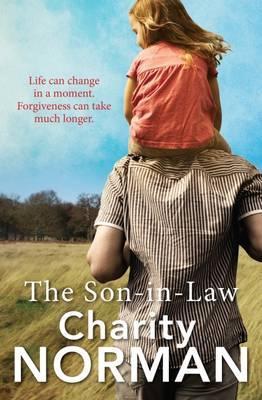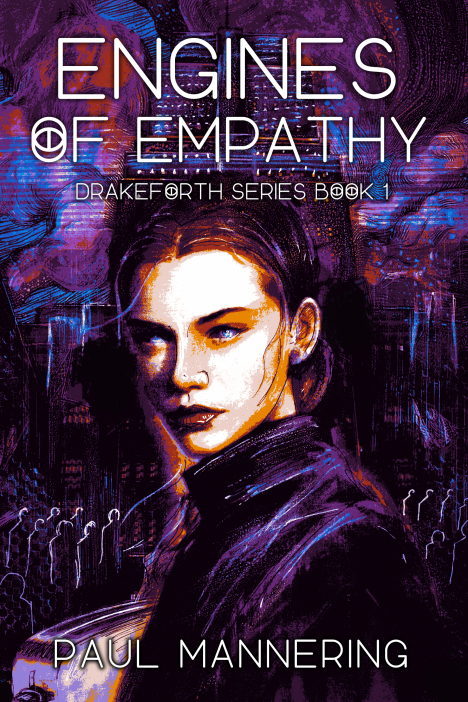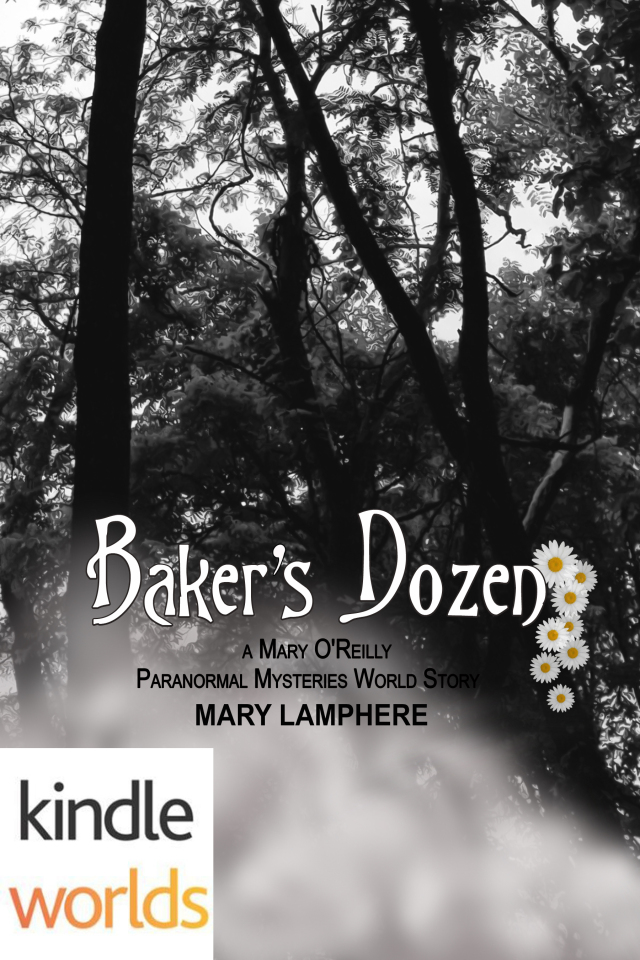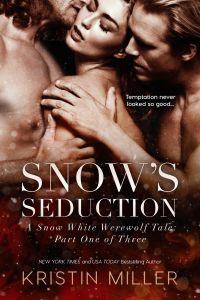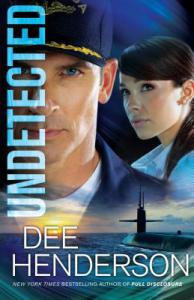“Who is Luke Skywalker?”
This is one question LucasFilm asked in the process of developing The Force Awakens, but once again, “Who is Luke Skywalker?” This question lies at not only the core of The Last Jedi, but for the entire original trilogy, pouring into the prequels. A character that is the centrepiece of the entire Skywalker saga; is Luke a hero, a legend? Do the Star Wars films define the character, or do the fans? This is one question that is prevalent in The Last Jedi, and it may be the deciding factor in one’s opinion of the film.
I should warn that this paragraph will be your last bastion before spoiler territory. Enjoyment of The Last Jedi is seemingly based on expectations on not just the film’s quality, but of its story. If I can make a suggestion, do not expect anything. Do not make any predictions, and do not expect a film that resembles The Force Awakens. The Last Jedi is the boldest Star Wars film to date, and also the most polarizing as evidenced by the Internet. I enjoyed the film: it is not without unfortunate flaws, but its highs are amongst the best in Star Wars. I do not like to rank these films as my rankings shift too often, but as of now it is roughly tied for third with Return of the Jedi, beneath A New Hope and The Empire Strikes Back.
Also, one last point before I delve into the film proper. If you expect me to either love or despise The Last Jedi, I am afraid I will disappoint you. Remember: only a Sith deals in absolutes… Even though that line within itself is an absolute. But still!
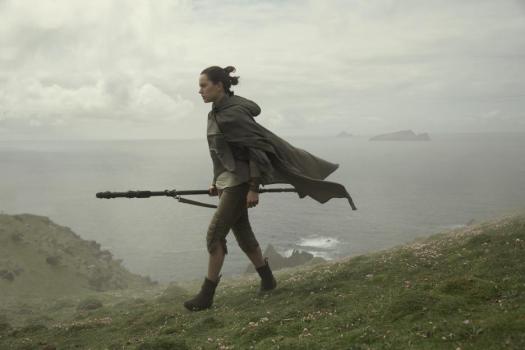
I want to look at The Last Jedi on its own, but a comparison with The Force Awakens is an inevitable point of discussion that needs to be brought up. The Last Jedi is a very interesting movie compared to The Force Awakens, to be straight. The effects of a different creative force behind the production are not only evidenced by the story, but also by filming, cinematography, tone, amongst other things. One scene involves Luke calling R2’s decision to show Leia’s message from A New Hope as cheap, which divides this film from its predecessor: its reliance on nostalgia is different. Now, The Last Jedi is still full of references and parallels to the past, but that’s what it is: parallels to tie the present to the past. There are many callbacks to The Empire Strikes Back and Return of the Jedi, but the film’s narrative structure does not pander to these similarities by mimicking another film’s plot.
Also, C-3PO lacks a red arm, which makes his ‘redesign’ in The Force Awakens the most pointless change in this franchise.
I Have a Bad Feeling About This – Some ShortcomingsNow, I want to get my complaints out of the way first. No film is perfect, and The Last Jedi is just another piece of evidence to this fact.
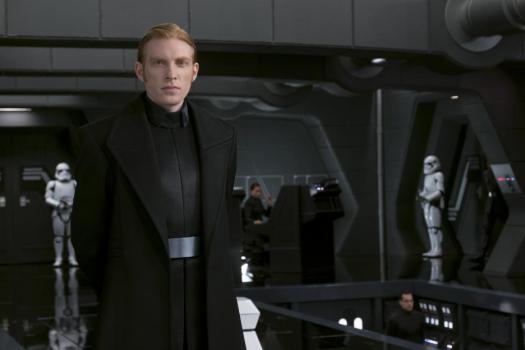
My least favourite part of this film is its humour. Now, here is the kicker: I found the majority of the jokes funny, but the manner in which these jokes are told is disappointing. A lot of the jokes in The Last Jedi are ‘laugh-out-loud’ jokes; these jokes are similar to those found in the Marvel Cinematic Universe. This brings me to my first complaint about the humour: its style. In previous Star Wars films, there were mostly two varieties of jokes: wit and ‘toilet humour.’ Prequels be damned, wit is what defined a lot of the original trilogy’s charm (as well as The Force Awakens), and this came from character interactions. The ‘laugh-out-loud’ humour does have its fans, but the fact that this film has a ‘your mom’ joke in its first minutes is indicative of things to come. My first complaint on humour would be just a matter of personal preference, but alas.
My second complaint on The Last Jedi‘s humour is its timing and its negative effect on the rest of the film. One example is at the very beginning of the film. Luke tosses his father’s lightsaber over his shoulder, which does make sense from a storytelling perspective. He is not a hero; he is a troubled human being. But the timing of this scene is for comedic value, which interrupts and diminishes its dramatic focus. Imagine if in Return of the Jedi, when Luke confronts the Emporer and Darth Vader, when he threw his lightsaber away in refusal, that Luke threw it in a comedic manner over his shoulder. Sure, it might be funny, but it would disrupt the dramatic focus of such a moment, and the tone of the film would go awry. With The Last Jedi‘s brand of humour, tone and drama are sacrificed for a laugh. Just think of General Hux, and how much of a literal punching bad he is in the film. A film can be dark; it can still find moments of light when things are at their worst.
One elephant in discussions of The Last Jedi is Finn, Rose, and their detour on the casino of Canto Bight. This portion of the film does feel out of place, but I can see the potential that was untapped. The animal cruelty theme was an unnecessary detour that is out of place, however. The casino did feel a bit ‘out of character’ for Star Wars, perhaps for how ordinary it was. A ‘space-casino’ would have been a much cooler idea, but as it stands, Canto Bight is a detour that should be fun, but it adds padding and takes away focus from the rest of the film. Its role in making Finn question the nature of the Resistance-First Order conflict with the role of arms dealers is an interesting concept, but it is simply preaching that serves no purpose for the rest of the film. Breaking down the ‘good versus evil’ trope is a strength of the film, but Canto Bight is a missed opportunity to explore a more ‘grey’ side of the galaxy.
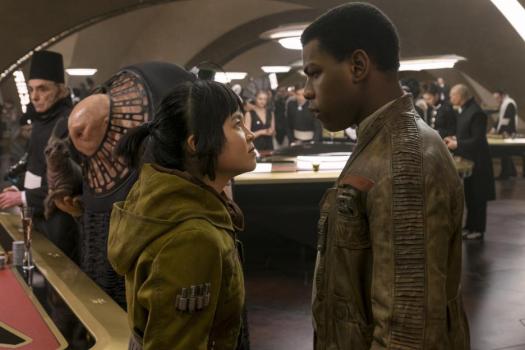
Now, this is where I am afraid to talk about one aspect that is definitely present: the role of women in The Last Jedi. I hope I do not offend you, as social equality is an issue in contemporary society that many feel strongly about on all sides. However, make no mistake; it is present in The Last Jedi, and it has a major thematic purpose. If you want to, you may skip the next paragraph, but I hope this portion of the review does not lose you.
Laura Dern’s character, Vice Admiral Amilyn Holdo, and Kelly Marie Tran’s character, Rose Tico, are representative of social issues, and I believe one cannot deny that. However, Dern’s character succeeds where Tran’s does not. Holdo is not a perfect character, as she is arrogant and lacks the qualities of an effective leader (this point is up for debate). Holdo is interesting, as her role within The Last Jedi is to defy expectations. She may not have a flaw to overcome, but not every character needs one; Holdo instead exists as a divisive character (and a strong one at that), and that is presented wonderfully. On the other hand, Rose is quite shallow and exists as a means to supplement Finn’s arc. A personal flaw to overcome (perhaps self-doubt?) could have been an interesting justification for Rose’s development and it could have juxtaposed with Finn’s, but instead, she only exists for the film to make its point on Finn’s motivations and heroics.
While more disappointments than flaws, there are some miscellaneous points I have for this section. I wanted more Rey (as well as Chewbacca, R2-D2, and C-3PO) in The Last Jedi, as there are larger portions of the film that do not include her. Captain Phasma is ‘cooler’ in her appearance, but it was once again disappointing. The humanity of such a character could have been explored, but alas, she might be dead. Snoke’s background could have also been interesting to explore, but that is a minor gripe that doesn’t bother me too much. The film’s pacing is also sometimes uneven, mostly due to Canto Bight. However, it does improve in the film’s latter half. Lastly, it feels as if The Last Jedi nearly wants to unveil a grey side of the Star Wars universe, but it backs off with this and ends the film on a disappointing ‘the Rebels are back’ note.
I would have also loved to have seen Lando return, but I suppose I cannot always get what I want.
In My Experience, There is No Such Thing as Luck – The GoodNow, with all my issues one may question why I think this film is great. In truth, The Last Jedi‘s fallings are disappointing, but its strengths more than make up for it!
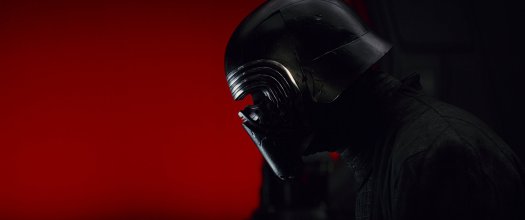
I have not touched upon the technical aspects of The Last Jedi, but as with its predecessor, the acting here is great. Even for characters I did not like too much, each actor pulled together an awesome performance, with Daisy Ridley, Adam Driver, and Mark Hammil taking the spotlight as Rey, Kylo Ren, and Luke Skywalker. The new cast members all put their own styles into their roles, fitting in naturally with established characters. Sound, props, digital shots (including one of the most awe-inspiring shots in a Star Wars film), and the score all come together to enhance the Star Wars experience, and I have no complaints regarding these aspects. Director Rian Johnson does have a distinct style of cinematography that sets this film apart from its peers, with shots I would not expect in a film like this. However, that distinction is what gives The Last Jedi so much flavour.
Visually and musically, The Last Jedi is a beauty. Noteworthy mentions go to Crait and Ahch-To, which both provide unique backdrops for action and storytelling. One notable absence in this film is a true lightsaber battle, although one scene in the middle with Rey and Kylo Ren serves as a chill-inducing substitute. The special effects are as well-done as they were in The Force Awakens, and it is a marvel that Supreme Leader Snoke looks realistic. Additionally, I was surprised by how much I enjoyed The Last Jedi‘s score, with many returning pieces feeling right at home and a lot of the new pieces (while more subdued than a lot of other ones) complimenting the film’s narrative quite nicely. John Williams has not lost his touch, and his score continues to enhance the experience of watching a Star Wars film. The piano rendition of Leia’s Theme in the film’s credits was also a very nice tribute to Carrie Fisher.
Perhaps another of the most contentious subjects of this movie is its treatment of Luke Skywalker’s character arc. I have seen many call The Last Jedi‘s portrayal of him as ‘character assassination’ – while I can see why one would come to that conclusion, I disagree and find this to indicate an inability to see a fictional character as an individual. “Who is Luke Skywalker?” I posed at the beginning of this review, and for good reason. This film shows him as a fallible character who deals with failure and regret, not as a mythical legend as one’s expectation (both in and out of universe) dictates. Luke Skywalker is The Last Jedi‘s hero, subverting expectation and overcoming his flaws for the better. His decision to attack Ben Solo is his sleep has also been a point of contention, but I see it as a part of his failure. Luke Skywalker is not the protagonist of the sequels; Rey is. The Last Jedi shows Luke’s growth as a person, and how a legend does not equal a man. For that, he is easily my favourite character in this film.
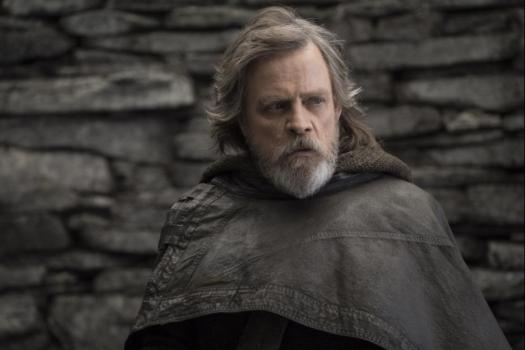
Rey and Kylo Ren are also highlights, as their arcs are another example of the film subverting expectations. Rey is a nobody: sorry, fan theories. Kylo Ren does not redeem himself, or even hint at such a direction; he instead plunges further into the dark side. The interactions between these two characters are another of The Last Jedi‘s strong points, carrying emotional weight and fleshing them both out as characters. Much alike to Luke Skywalker, they are grounded as people instead of larger-than-life figures, putting their stories in a very interesting place for Episode IX.
While not groundbreaking by any means, the themes in this film are the final point I want to address. Sacrifice, heroism, and failure are all present here, and they are deconstructed and examined brilliantly. With Finn and Poe (thank goodness the middle of which appears far more often in this film), sacrifice is noted as not always being for the greater good, as some sacrifices can be for nothing. Luke Skywalker portrays heroism as he did in the original trilogy, and his appearance for the Resistance was quite awe-inspiring. As mentioned with him, failure is The Last Jedi‘s grounding element that makes this film feel less about ‘good-versus-evil’ and more about the struggles of an individual.
Of course, this is all tied nicely with Kylo Ren’s assertion to let the past die, as that is what this film is about. There are new heroes to explore, new beginnings to unfold, and of course, all things must come to an end. With The Last Jedi, that process has been fulfilled. I will not rate this film, as that is cheap. However, I do encourage you to watch it, as it is both the boldest Star Wars film as well as the best of the new Disney-era films by a clear margin. Although its lows are unfortunate lows (lows which The Force Awakens did not stoop to), its highs are very high and make up for it with some of the best moments in this franchise. The Last Jedi is not the best film I have seen this year, but I am very excited to see where J.J. Abrams takes Episode IX, and where Rian Johnson takes his future trilogy.
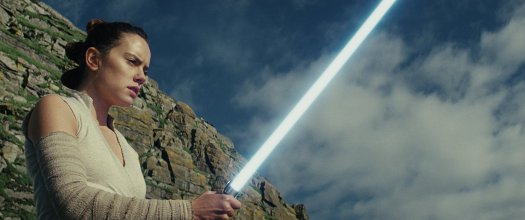
If there are any elements of The Last Jedi that I did not touch base upon, it most likely means that I liked it, or that I did not find it noteworthy enough to talk about. Leia flying across space did not bother me, for one. On the subject of Carrie Fisher, I am somewhat surprised that the film did not address how her death will affect the future of Leia’s character, as the film’s narrative almost makes it feel as if she will appear in Episode IX. There is not goodbye scene on a highway, I am afraid.
***
Anyway, if there are any additional comments you have, please feel free to comment and I will respond to the best of my ability! I apologize for lacking the ability to properly dissect what I liked in this film, as it is sadly easier for me to put my complaints into perspective. There will likely be a month-end post to collect my impressions of works I have experienced over both this month and November (which I decided to skip due to a lack of content), but who knows what the future holds?
Advertisements Share this: